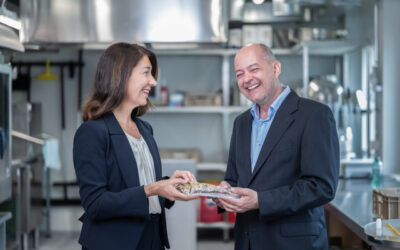Christina Senn-Jakobsen: “We can only transform global food systems in collaboration with the global players”

At COP 28, Mariam bint Mohammed Almheiri, UAE’s minister of Climate Change and Environment said that our climate goals simply can’t be achieved without urgently creating more sustainable and resilient food systems.
On the same day, 134 countries including Switzerland signed a landmark declaration – the first of its kind for the COP process – committing to put food systems and agriculture at the heart of their climate ambitions. A coalition of farmers, businesses and civil society groups – including SFNV partners dsm-firmenich, Nestlé and Tetra Pak – signed a “Non-State Actors Call to Action” that highlights food and agriculture as solutions, and not just drivers, of the global climate crisis and commits to put the declaration into action.
As a big believer in collaborative approaches, I was thrilled to see partners coming together to put food at the heart of their climate plans. But I also know that top-level commitments like these are often met with a certain level of scepticism. In fact, at events, I frequently hear colleagues ask critical but fair questions about the role of global food system players, and whether they’re doing enough to accelerate transformation.
In a world where our food systems are responsible for a third of our global greenhouse gas emissions while a third of all food produced is lost or wasted, I understand the frustration and the need for speed. And I also recognise why multinational companies – that represent such a huge part of global supply chains – are seen as part of the problem. But at the same time, I believe that they are an essential part of the solution.
Why global players are part of the solution
To understand where we are today and where we are going, I think it helps to explore where we’ve come from. Since the industrial revolution, our food system has been geared towards producing safe food at highest output and at lowest cost. Global food players emerged as pioneers that used the latest technologies to provide a growing population with long-lasting, affordable and more convenient choices. But some of these approaches also led to new challenges for the world and its population – something only truly acknowledged by the first climate change legislation which came into force in 1994.
Today, we know that there is a rapidly closing window of opportunity to secure a liveable and sustainable future for all. Geo-political developments have been a wake-up call for the food industry. The global pandemic, the war in Ukraine and the resulting energy crisis, combined with the impact of failed harvests due to extreme weather conditions have exposed the fragility of our food systems. It’s clear that sustainability and positive climate impact must be central to the business models of the future.
The sheer size and geographical coverage of global food system players mean that the actions they take have a huge potential for rapid transformation. Large enterprises have always been experts at using insights to respond to, and stay slightly ahead of, consumer demand. Today, they’re drawing on their broad scientific knowledge, extensive talent pool, their infrastructure and processing capacity and global logistic systems to re-imagine processes and products that align business and sustainability objectives. And they’re investing to scale the solutions that have the biggest impact. In my opinion, we simply cannot feed the world nutritiously and safely without them.
But rethinking the way we produce and consume food is not just about launching a few new products in a few key markets. We need systemic change to embed more sustainable practices across global supply chains — from the way food is grown, processed, packed, distributed and marketed to how it is consumed and disposed of.
Accelerating the transition
In the 13 years that I worked for a multinational company, I witnessed first-hand how company culture and mindsets can shift. Teams recognised the limits of a “not-invented-here” mentality and saw that spotting and acting on win-win synergies is the most successful way of doing business.
Today, global food system players know that they can’t achieve their objectives in silos. They need to work alongside customers to help them innovate and empower stakeholders across their supply chains to take action, through financial incentives or practical support. They also recognise that, despite their size, they’re still just one partner in a broad and diverse ecosystem and through partnerships with peers, academia and startups they can leverage their complementary strengths and move forward faster. They also operate at local level, working alongside SMEs and connecting into regionally relevant technologies, products and solutions to drive food system sustainability.
Take food waste. According to Project Drawdown, reducing food waste is the number one action that the world can take to mitigate climate change before 2050 – but impact depends on a broad range of interconnected issues from changes in legislation to changes in our shopping habits. From investing in research to tackle post-harvest losses and developing new processing and packaging technology to upcycling byproducts, using intelligent inventory management systems and finding new ways to valorize side streams, large enterprises are developing solutions that reduce supply chain waste and boost products’ nutritional value, while creating new business opportunities.
Tetra Pak: Transforming food processing to minimise waste
- Today, around 40 million tons of brewers’ grain are used as animal feed or as landfill each year and typically one third of every soybean is lost in processing, despite both side streams being rich in fibre and protein.
- Working alongside food manufacturers, Tetra Pak developed technology to transform spent brewers’ grain into a high-value liquid ingredient and use the whole soybean in plant-based beverages, increasing the fibre content without impacting taste or texture.
- These measures, alongside others, contribute to their target to achieve a 50% reduction of product loss in best-practice processing lines by 2030.
Regenerative agriculture is another example. The Earth’s soil capacity is declining so dramatically that some experts predict that we have fewer than 60 harvests remaining. Recognising that a significant proportion of their greenhouse gas emissions come from agriculture, many large companies are investing in research, programmes and practical support to drive uptake of regenerative agricultural practices in their supply chains, inspiring farmers to make the transition and mitigating some of the risks they face when stepping out of the standard industrial model. Building on this momentum, many have been involved in shaping the recently announced COP 28 Action Agenda on Regenerative Landscapes, an initiative that will help to share learnings between actors active in this space and broker new partnerships to accelerate progress.
ADM & Nestlé: Scaling regenerative agricultural practices across supply chains
- Nearly two-thirds of Nestlé’s global greenhouse gas emissions come from sourcing ingredients – so Nestlé has committed to sourcing 50% of their key ingredients – around 14 million tonnes – through regenerative agriculture methods by 2030.
- In July this year, Nestlé and ADM teamed up to enable regenerative agricultural practices in their wheat supply chain through a combination of financial support and technical resources and assistance.
- ADM also recently released a comprehensive report summarising their progress in this space, sharing that they’ve enrolled partners working on 2 million acres of farmland to date and they plan to reach 4 million acres by 2025.
A focus on collaboration and co-creation
Of course, global food system players have a lot more work to do and it’s ok if we remind them of their responsibility, given their potential impact. Our understanding of the most effective approaches is constantly evolving. New frameworks, like the EU’s Corporate Sustainability Reporting Directive, will harmonise how we talk about sustainability, boost transparency, and ensure that companies honour their commitments, while helping them to spot new opportunities for innovation.
For me, the answer lies where this article began: a commitment to collaborate and put words into action – across ecosystems, both nationally and internationally. Whether you’re a startup, a policymaker, a change maker, or a researcher, exchanging and teaming up with large companies could boost your reach and impact. There’s no time to lose and the Valley’s global partners are ready. Let’s co-create.
Find out more about the Valley’s large enterprise partners
Our 140+ strong community of Swiss food innovators includes 7 large enterprises. You can read more about their individual commitments and initiatives via the links below.
ADM | ALDI SUISSE | Bühler | dsm-firmenich | Givaudan | Nestlé | Tetra Pak
Never miss a Swiss food innovation morsel.
Latest News
Yumame Foods and Le Patron partner for a delicious, plant-based future of food
Valley partner Yumame Foods and the...
What the food industry can learn from GDI’s Major Shifts model
The future is coming faster than many...
Meet the finalists of the Igeho Rising Star Award for 2025
Many startups applied. 15 made it to...
Nestlé and IBM leverage AI and deep tech to unlock new packaging innovations
Valley partner, Nestlé R&D has...




